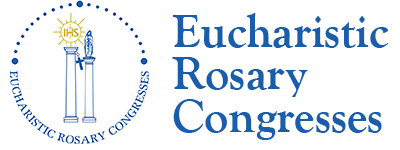
2024 Eucharistic Rosary Congress
to include 7 days of perpetual adoration
Reproduced by express permission of Catholic Vote - original article may be found here.
Photo Credit: Leonardo Zanini
on
CV NEWS FEED // This October, over 200 parishes across the United States will participate in the 2024 Eucharistic Rosary Congress, praying the rosary every hour for seven consecutive days in front of the Blessed Sacrament.
Eucharistic Rosary Congress President Kristin Bird, Chair Betty Belk and Board Secretary Peggy Downs shared with CatholicVote about the congress and its mission, which is “to bring every soul to Jesus Christ in the Eucharist through Mary and the Rosary.”
For participating parishes, the 2024 ERC is set to begin with a Mass on Oct. 5. The congress closes with the celebration of the Mass as well, on Oct. 11.
“What sets this week apart is the fact that we seek, as a community, the hourly intercession of our Mother Mary as she stands in the breach with her Son in the Blessed Sacrament interceding on our behalf to the Father,” the leaders of the event said in an email that CatholicVote received.
The theme this year is “Do Whatever He Tells You.” In the Gospel, these are the words that the Blessed Mother spoke to those at the Wedding Feast at Cana, directing them to obey Jesus.
The leaders said the organization chose this theme to harmonize with the theme of the National Eucharistic Revival’s third year, which begins in July, after the National Eucharist Congress. Revival organizers have named the period of July 21, 2024, through Pentecost 2025 “the year of going out on mission.”
Though the theme varies by the year, the intentions of the rosary congress remain the same, according to the leaders. “[The intentions are] offered in a spirit of reparation to restore the sanctity of life; to establish peace in our hearts, our families, our Church, and our nation; and to console the hearts of Jesus and Mary,” they said.
Since 2017, the congresses have begun on the First Saturday of the designated month, in honor of Our Lady of Fatima’s request for First Saturday devotion prayers.
The congress originated in Poland, in 1978, when Pope John Paul II desired to visit there but the communist Polish government would not permit him to travel to certain parts of his homeland.
“Through a private revelation, Our Lady requested seven days and nights of continuous Rosaries to be said before the Blessed Sacrament… at the shrine of Our Lady of Czestochowa, in Jasna Gora. The prayers were to be offered for a resolution of the impasse preventing the papal pilgrimage,” the leaders said.
The Polish people held the first Eucharistic Rosary Congress, as instructed. On the seventh and last day of the congress, the Communist government “unexpectedly relented and removed all the obstacles to the papal visit,” the leaders continued. The pope’s subsequent visit to Poland is credited with the beginning of the fall of communism in that part of the world.
Anatol Kaszczuk, one of the Polish organizers, traveled to America in 1988 and located a lay Marian group that helped promote the congresses in the United States. The First National Rosary Congress was held in Washington, D.C., in 1988. The movement has since spread across the states.
In 2023, 250 parishes across the U.S. participated in the ERC. The organizers are estimating that a similar number of parishes will participate again this year.
The congress leaders encourage parishioners to participate and organize a local congress, within their parish, with seven days of perpetual Eucharistic adoration and hourly recitation of the rosary. Resources, like a planning timeline and ideas for how to make the event simple or elaborate, are available on the organization’s website.
“An ERC is designed to be run by the laity in collaboration with the parish priest,” the leaders said. “The priest’s participation is vital in promoting the ERC to the congregation and supporting the coordinators, as well as celebrating the sacramental life of the Eucharistic Rosary Congress.”
The leaders emphasized that there is still time for interested parishioners to start and organize an ERC before October. Parishes can plan a “full” or “basic” ERC, or even a “Traveling Rosary Congress.”
“Each parish has options regarding how elaborate they make their Eucharistic Rosary Congress,” they said. For example, there might be Eucharistic or Marian processions to start and end the congress, guest speakers during the week, special themes for each day, or involvement by their parish school.
The leaders encouraged interested laity to “pray hard” about hosting a congress.
“It is a powerful and intense week of spiritual warfare with the lightest, most joyous weapons ever, the Rosary and the Eucharist,” they said. “When a person responds to Our Lady with a ‘yes!’, she takes it upon herself to help efficaciously in this battle.”
Catholics in dioceses that will not have a congress can still participate by attending adoration and uniting their prayers with those of all the ERCs across the states, the leaders said.
The leaders likened these participants’ spiritual support to the help Aaron and Hur provided to Moses during a battle between the Israelites and the Amalekites. During the fight, Moses held his arms up in prayer, so that the Amalekites would be defeated. When Moses was weary from holding his arms up, Aaron and Hur supported him. Because of this help and prayer, the Israelites were victorious.
“In the Old Testament days when battles raged all around, it was the prayerfulness of the Israelites that persevered and won those battles,” the congress leaders said. “Are we not in need of Aarons, Hurs, and Moses’ these days? Every prayer warrior is necessary and needed!”

